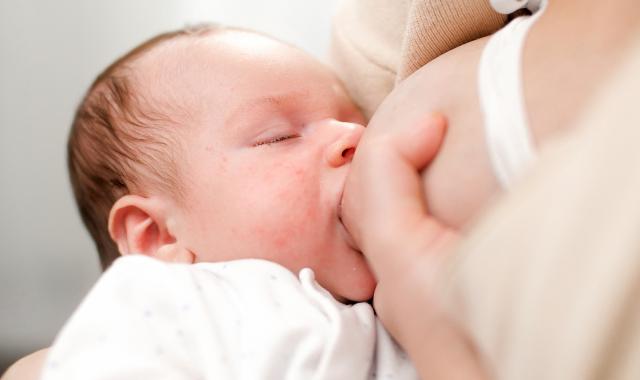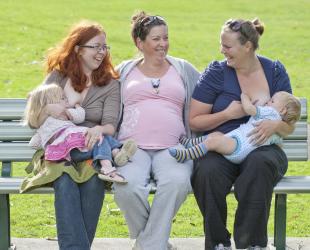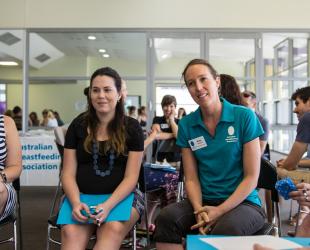Breastmilk and breastfeeding in the first days
by Simone Casey

I sometimes hear stories about women who couldn’t breastfeed because their milk didn’t come in. If the milk was delayed for a medical reason and the mum isn’t encouraged to continue initiating breastfeeding, she may believe she’s just one of those women who doesn’t have milk and give up. If she doesn’t pump or attempt to put the baby to the breast and baby goes straight on the bottle, it can even appear as if the milk never arrived at all. But it would have, given half a chance.
It’s rare for a mother’s milk to not eventually come in, as it’s a hormonal response to the placenta being removed from the body. The general time for this to happen is 48 to 72 hours after birth, but things like a large blood loss, retained placenta, conditions like diabetes, hypothyroidism, obesity, polycystic ovarian syndrome or past breast surgeries can interfere with the natural process, as can rare conditions like insufficient glandular tissue. Now that I look at it, this seems like a long list, but these are all reasons for a longer milky pause, so the message is to keep at it and don’t panic.
If there is a delay, it’s a matter of looking at why and what can be done to feed your baby in the meantime. A few years ago, I interviewed author (and now UNICEF Australia’s Breastfeeding Patron) Tara Moss in my former job as a magazine editor. Her story was typical of a new mum who was gutted to be told her body wasn’t responding the way it should. On the second day after giving birth, a paediatrician decided her milk was slow to come in and her baby was prescribed formula. Day 2! That’s 48 hours after birth. For a first-time mum, it is really normal for the milk to take the full 4 days to come in, sometimes even 5 or 6. Many mums find their milk comes in much quicker with subsequent children (mine was in at 30 hours with No. 3 and that was after a highly medicalised Caesar because of placenta praevia).
The important thing is to keep putting the baby to the breast. Let your baby drink that colostrum! Her stomach is teeny tiny, only the size of a 5 mL marble, so it really doesn’t need the volume of mature milk yet. Yes, she will lose weight. Yes, she may even lose a little more than 10 per cent (take into account if you’ve been on IV fluids prior to the birth of your baby, as this could elevate your baby’s birth weight). This can be closely monitored but if your baby is breastfeeding well and has a good output, then there may be little reason to pull out the formula tin.
If your milk still isn’t in by day 5 or 6 and your doctors are getting concerned, there are a number of options. You could start expressing and give baby whatever colostrum you have. If that’s not enough, you could source donor milk (especially if you have a friend or relative who is breastfeeding) or if that’s not available, a small volume of formula used as a top-up in a cup or syringe after a feed at the breast. If none of these options appeal, you could ask to be seen by a lactation consultant, wait another day, and just feed, feed, feed, every hour if you have to, and you may find that’s all you needed, voila, milk in!
Simone Casey is an Australian Breastfeeding Association counsellor and community educator from Northern Melbourne. She’s breastfed three children over nine years and has been volunteering with ABA for over 13 years, with a 6-year stint as group leader of the Pascoe Hume Group and several years as regional representative of the Tullamarine Region. Simone was a journalist for 20 years so has loved combining her writing skills with her breastfeeding knowledge to create blogs for the national website and now recording this podcast series. In 2011 she qualified as an International Board Certified Lactation Consultant and works in a private inner city hospital and runs her own lactation business doing home visits. Her volunteering highlight was at a branch conference in Ballarat when a trainee referred to her as ‘the Kylie Minogue of breastfeeding’.
More information
What happens when your milk comes in? In this episode Belinda and Naomi talk about breastfeeding in the first few days after birth of your baby.
- Access our free info kit.
- Download our mum2mum app via the App store or Google Play.
- Call the National Breastfeeding Helpline on 1800 686 268, available 24 hours a day, 7 days a week.
- Chat with a volunteer via LiveChat on our website.
- Sign up for an interactive and informative local breastfeeding class or online breastfeeding workshop.
- Get books and resources on general and specialist breastfeeding topics.
- Join ABA as a member to get your free copy of our best-selling book Breastfeeding … naturally + free access to all premium content on the mum2mum app + discounted breastfeeding classes + half-price breast pump hire + unlimited access to ABA events + more!



